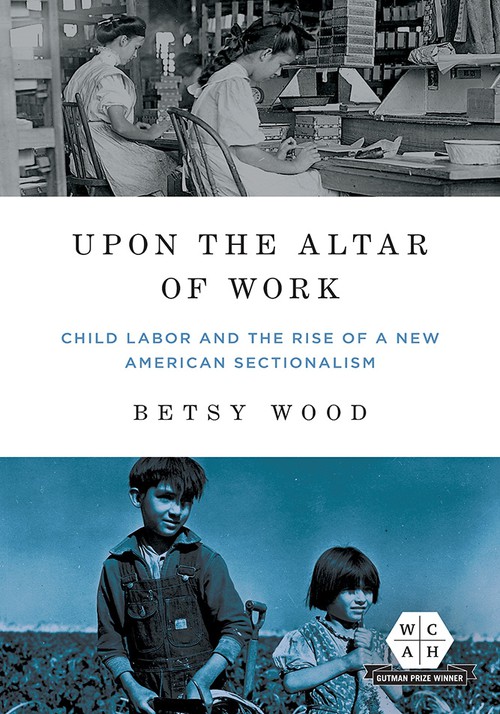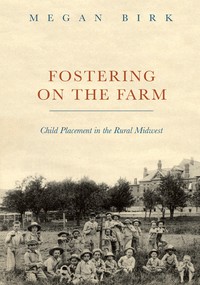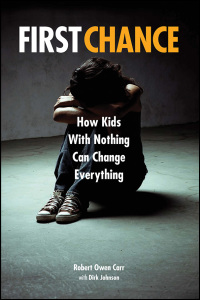
Upon the Altar of Work
Cloth: 09/14/2020
About the Book
Rooted in the crisis over slavery, disagreements about child labor broke down along sectional lines between the North and South. For decades after emancipation, the child labor issue shaped how Northerners and Southerners defined fundamental concepts of American life such as work, freedom, the market, and the state.Betsy Wood examines the evolution of ideas about child labor and the on-the-ground politics of the issue against the backdrop of broad developments related to slavery and emancipation, industrial capitalism, moral and social reform, and American politics and religion. Wood explains how the decades-long battle over child labor created enduring political and ideological divisions within capitalist society that divided the gatekeepers of modernity from the cultural warriors who opposed them. Tracing the ideological origins and the politics of the child labor battle over the course of eighty years, this book tells the story of how child labor debates bequeathed an enduring legacy of sectionalist conflict to modern American capitalist society.
About the Author
Betsy Wood is an assistant professor of history at Bard Early College.Reviews
"Wood opens new views and makes exciting comparisons and contrasts of the ways sectional disputes informed child labor disputes that emerged from or were influenced by discussions of free labor and slave labor." --Pennsylvania History"Recommended." --Choice
"Wood’s most useful contribution, is the connection made between the hyper-sectionalism caused by the issue of slavery to the post-emancipation campaigns against child labor that Wood convincingly argues became central to the new sectionalism that developed over the decades following the Civil War. . . . A very good book that should inspire additional research in other times and places." --Journal of the History of Childhood and Youth
"Upon the Altar of Work manages to make well-worn subject matter feel fresh, exciting, and original. . . . Betsy Wood's work reveals how far we have come in combating that evil, while reminding readers of the work yet to be done." --Labor/Le Travail
"Slim, engaging . . . Upon the Altar of Work offers a new interpretation by highlighting postbellum reformers' discursive invocations of free and unfree labor, concepts that heretofore have occupied the attention of scholars of slavery, abolition, Reconstruction, and postemancipation society and culture." --Journal of Civil War Era
"An innovative and persuasive narrative that traces the evolution of ideas championed by child labor reformers from their free labor roots to their faith in the modern bureaucratic state. . . .Upon the Altar of Work is a well-researched, crisply argued, and excellent addition to the scholarship on the politics of child labor reform." --Journal of Southern History
"Upon the Altar of Work is an exemplary work of intellectual and political history. Wood's skilled analysis closely tracks the arguments against child labor across decades with acute attention to both specific language and symbols and the wider context." --Labor
"In this engaging book, Betsy Wood invites us to re-evaluate the history of sectionalist conflict through the lens of child labor reform. . . . Upon the Altar of Work demonstrates just how important debates over child labor were to understandings of capitalism, morality, and freedom, in both the North and South, in the years after slavery's legal demise." --American Nineteenth Century History
"Wood's book demonstrates the long history of conceptualizing child labor as battles over region, progress, and childhood, one that hopefully other scholars will apply to the present. It's an excellent work well worth the attention of all labor and southern historians." --Register of the Kentucky Historical Society
"Wood's ambitious book recognizes and highlights the importance of child labor as a cultural symbol and should spark new investigations of this topic." --Journal of American History
“Wood opens new views and makes exciting comparisons and contrasts of the ways sectional disputes informed child labor disputes that emerged from or were influenced by discussions of free labor and slave labor.” --Pennsylvania History: A Journal of Mid-Atlantic Studies
Blurbs
"Betsy Wood manages to say highly original things about an old subject--the movement to abolish child labor. Was the labor of children a new form of slavery or an embodiment of the free labor ideal sanctified by the Civil War? Wood shows how, despite (white) sectional reconciliation, a deep divide between reform-minded northerners and rural southerners over child labor, and the power of the government to abolish it, persisted well into the twentieth century. At a time when millions of children are at work throughout the world, the book is extraordinarily timely."--Eric Foner, Columbia University








